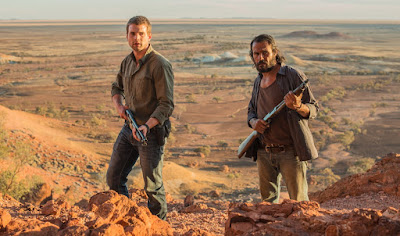To immediately differentiate, the DISCLOSURE under review here is an Australian narrative movie about possible child abuse (by another child), rather than the recently debuted Netflix documentary about the transgendered.
Beyond that, how interesting it is -- one day after another -- to view a movie whose theme is the problematic malleability of something so encompassing as the "truth" of a situation.
The last film reviewed here was indeed The Truth, and now today we have another in which that truth of a particular situation is hugely complicated by everything and everyone that surrounds it.
While Kore-Eda Hirokasu's movie questions how important the truth actually is to the well-being of the family at its center, Disclosure -- written and directed by Michael Bentham (pictured at right) -- does precisely the opposite.
The actuality of learning what happened between the children involved in the abuse is vital, yet the concerns of the two sets of parents slowly come to control the narrative and run roughshod over everything -- including that difficult-but-necessary-to-determine "truth."
Disclosure is Mr. Bentham's first full-length narrative film, and as such it's a worthwhile endeavor. Beginning with a scene of one set of parents filming their own fucking session, Bentham's camera moves to a gliding, slo-mo look at what seems like an idyllic, lily-white, upper-class community, coming to rest on and into one particular house in which mom chats on the phone as a child's screaming is suddenly heard behind a closed door. Mom opens the door and angrily orders those inside to take their problems outside.
End of that situation.
Except it's not. The mother, Bek (Geraldine Hakewill, above) clearly ought to have been paying more attention. We do -- but then we know a bit more about what to expect here -- and that child's scream does resonate. The remainder of the movie takes place on a warm, sunny afternoon around the pool and large, verdant grounds and/or in the home of the parents of the little girl who appears to have been the victim of the abuse. Here, Bek and her husband Joel, a local (and by the looks of things highly successful) politician, played by Tom Wren, below, show up unannounced, determined to make this whole untidy affair go away. Bek and Joel's two sons, you see, were somehow involved in the abuse allegations, while Bek herself was a victim of abuse as a teenager.
This set-up is riveting enough, and the more we learn about these two couples -- the little girl's parents, Emily and Danny are played by Matilda Ridgway and Mark Leonard Winter, shown respectively, left and right, below -- the more complicated everything becomes. Though it does seem clear, from nearly the get-go, that while Emily and Danny may enjoy filming their own fuck sessions, much more toxic is the fact that Bek and Joel are unwilling even to explore what has happened between these children.
Further complications ensue via the raising of the question of what makes "good" parenting (pitting helicopter parent Bek against somewhat absentee parent Emily), an upcoming election for Joel, and an important book deal for Danny. As the needs of the parents slowly seem to outweigh those of their kids, tensions rise and tempers flare, leading to a finale in which you will wish that these four people could be able to stand back a bit and openly laugh at themselves -- before you do it for them. This scene suddenly leaps into near-black comedy.
If the film unfortunately rises to melodrama instead of the drama you might hope for, it certainly holds your mind and emotions taut throughout. And its last shots beautifully convey the importance of what really is at stake here, and who might most benefit from (or be destroyed by) the outcome.
From Breaking Glass Pictures and running a just-right 86 minutes, Disclosure made its home video debut this past week -- on VOD and DVD. It is certainly worth a look.


























































